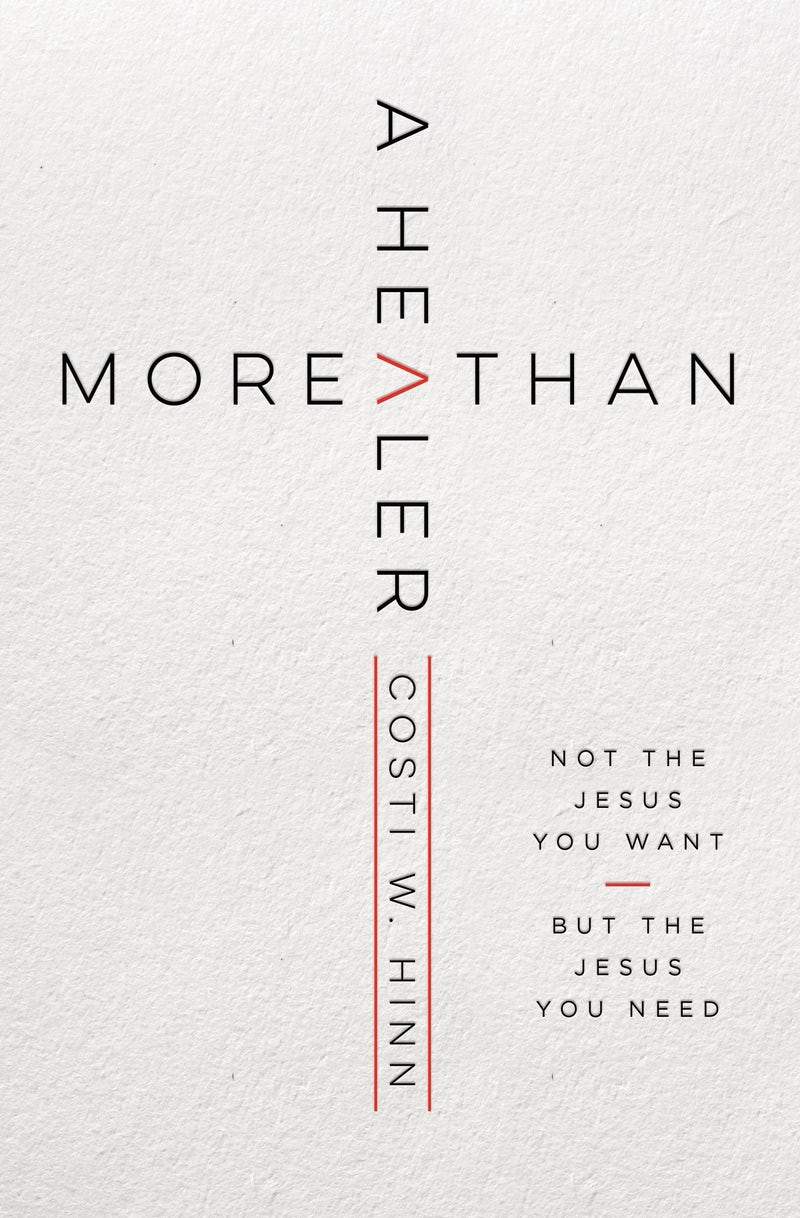Costi Hinn’s son was still a baby when he was diagnosed with cancer. Hinn remembers the night he and his wife Christyne found out: “It felt like someone had sucked every ounce of oxygen out of the room.” (3) Unfortunately, the blows kept coming. Costi and his family didn’t just have to endure cancer—they had to face family telling them it was their fault. One relative said it was a sign of God’s wrath—punishment on Hinn for speaking against the prosperity gospel movement his extended family is wrapped up in.
All this to say, when Hinn speaks about the topics of suffering and healing in his latest book, More Than A Healer, he’s not theorising. When he rebukes the claims of the prosperity gospel, he’s not speaking in the abstract. This is his life.[1]
It felt like someone had sucked every ounce of oxygen out of the room
Asking Questions
The focus of More Than A Healer isn’t the topic of healing, but the person Jesus Christ. One of its great strengths is Hinn doesn’t just present us with the truth about Jesus, but compels us to respond. In essence, he says: ‘This is who Jesus is, and this is what Jesus has done and is doing—is this how you see Jesus?’ He does this through “Questions for Reflection” to conclude each chapter, but also by peppering questions throughout.

More Than A Healer
Costi W. Hinn
Growing up immersed in one of the world’s leading faith-healing dynasties, Costi witnessed the tragedy of people chasing after healing more than the Healer. And now he shares with others the true power and hope that comes from a genuine relationship with God.
More than chasing after the Jesus we want, this hopeful and encouraging book will guide us to discovering the Jesus we truly need.
So, having shown how Jesus’ healing cannot be magically summoned by faith or obedience, Hinn asks, “In what ways do you tend to love Jesus with a transactional love?” (25) When he declares Jesus is the Saviour who fulfils our deepest need, Hinn enquires:
Is it possible that some of these good things in life are what you are truly seeking, and Jesus is more of a cherry on top than anything else? (57)
Or, after defining Jesus’ goodness as dependent on his nature and not our circumstances, Hinn presses further:
Now personalise this truth. Is God still good if … ? Answering that question will test your view of God. (106)
Simply because it asks questions about how we perceive Jesus, More Than A Healer is worth reading.
Compelling Truth
Some writers disregard truth for the sake of gratifying their readers’ whims—all form and no substance. Others author books that contain glorious truth but are laboursome to read—profound in substance but lacking in form. More Than A Healer belongs to a third category—Hinn revels in and promotes gospel truth through fluent and compelling writing. Take the following, for example, where Hinn is discussing the truth that “Jesus is Saviour”:
Again, none of this diminishes God’s love or power to heal you on earth. Rather it should elevate your view of his love and power because it showcases his desire to be with you in heaven. (49)
At other times, his prose verges on poetic. Note his alluring language does not distract from the truth, but rather amplifies it. As John Piper has suggested, in “find[ing] fitting words for these wonders, we see and savour them more deeply”.[2] In the below excerpt, Hinn compares our natural tendencies towards attaining peace to a squirrel’s collection of nuts:
Like squirrels hoarding piles of nuts for winter, we believe that the more resources we have, the more likely we are to beat the elements, protect ourselves from peril, and survive. But is that how peace works? Gathering enough stuff until you feel peace? Can all the nuts in a forest protect a squirrel from a raging forest fire? No. Neither can all the money in the world save anyone from the brevity of life. (29-30)
The result—at least for me—was old truths expressed with fresh clarity.
Wrestling with the Target Audience
More Than A Healer has a particular demographic in mind: people new to, or unfamiliar with, protestant Christianity—particularly those exposed to prosperity gospel theology. As a result, many of the topics Hinn explores are anchored by an assumption the reader is learning of them for the first time. He regularly addresses the reader, telling them to “hear me out” (51) because some of the doctrines he describes “may seem crazy” (63).
Despite that likely being an initial reaction for many, I can imagine a reader previously enveloped in the haze of the prosperity gospel being set free by the truth of who Jesus is (Jn 8:31-32). What relief to realise God is not being unfaithful but actually never promises to “take away the pain” in this life (112). What joy to discover God’s sovereign hand triumphs as he “gets the final word” (159). Even as someone who has heard these truths before, they bring me much delight, soaking me in scripture so I can taste and see the Jesus of the Bible.
But on the other hand, Hinn’s narrow target audience meant I didn’t necessarily resonate with everything he said. For example, he says “often you may hear” Romans 8:28 means God will give physical blessing and prosperity out of hardship (108); this simply hasn’t been my experience. He also expects readers to have an “immediate situation” (108) for which they’re looking to Jesus for healing—admittedly this was probably implied in his “More Than A Healer” title. Consequently, some of Hinn’s phrasing isolated and disengaged me as a reader, even though the truth he was declaring was still relevant.
Now, this is okay. I felt like Hinn wasn’t talking to me because he isn’t; he has a specific audience in mind. But I still had to consider my response. Putting the book down wasn’t an option—More Than A Healer is like a map to buried treasure, even if the occasional clue is difficult to decipher. My initial reaction was to skim those sentences or paragraphs that didn’t seem applicable. But I forced myself to read slowly for two reasons:
- One day the “you” who is suffering might be me, so I need to be prepared for when the time comes. Knowing these truths is good, but being ready to apply them to my circumstance is better.
- This is the experience of others. Just because my friends and I aren’t experiencing this doesn’t mean no one is.[3] I need to lift my eyes above my own horizons to see how others are quietly wrestling with being fed false pretences about Jesus, or struggling in a not-yet-healed circumstance. Reading slowly means I catch a glimpse of what’s going on in their heads and hearts; it enables me to empathise as one who weeps alongside them (Rom 12:15); and it prepares me for future conversations, interactions and relationships.
Putting the book down wasn’t an option—More Than A Healer is like a map to buried treasure, even if the occasional clue is difficult to decipher.
More Than A Healer
Hinn directs us towards Jesus: Do we really know him? Do we actually understand his priorities? Do we know who he is and what he has done?
Hinn is out to challenge the assumption Jesus is simply concerned with our physical health and well-being. Yes, he is Healer (ch1). But he is also Peace (Ch2). He is Saviour (ch3). He is Hope (ch4). He is Comfort (ch5). He is Good (ch6). He is Love (ch7). He is Justice (ch8). He is Sovereign (ch9).
So, look to him for more than healing. And love him for more than his healing. Jesus is More Than A Healer.
[1] You can read more about Hinn’s experiences growing up in the prosperity gospel movement (including as the nephew of famous preacher Benny Hinn) in his memoir, God, Greed, and the (Prosperity) Gospel.
[2] John Piper, 21 Servants of Sovereign Joy: Faithful, Flawed, Fruitful (Wheaton, Illinois: Crossway, 2018), 595.
[3] See subheading, “The Power of ‘Everyone'”, in Emily Jensen, “Our Friends Shape Us More Than We Think”, The Gospel Coalition, Jan 4, 2022, https://www.thegospelcoalition.org/article/friends-shape/















